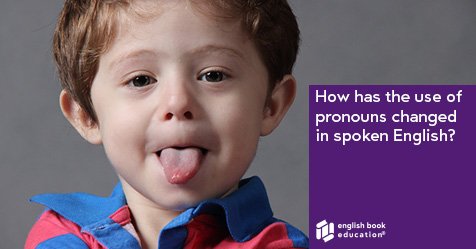In this article, Vaclav Brezina, author of Statistics in Corpus Linguistics: A Practical Guide and Linguistics and English Language lecturer discusses the changing use of pronouns in spoken English.
We rarely think of pronouns – small words such as I, you, my, they and their etc. However, we use these small words very frequently in everyday language. In fact, research shows that personal pronouns occur 100 thousand times per million words in current spoken British English. This means that on average, every tenth word in a sentence will be a pronoun. We also know that there is an interesting gender pattern in pronoun use: generally, women use more pronouns than men. Women are typically engaged in a more involved style of speaking with frequent references to the speaker (I) and other people (he, she, they etc.). There are also differences according to the social class and the region.
Pronoun use has also changed over time, one of the major changes is the way we address other people. For example, in Shakespeare’s times the personal pronoun thou (‘Thou art a scholar; speak to it, Horatio’ Hamlet, I,1.) was used to refer to a single person in a conversation as opposed to multiple people, in which case you would be used. This distinction has disappeared since then – in fact already in Shakespeare’s times the use of you and thou was often interchangeable – and thou has vanished from everyday use. Occasionally, today we can still see thou being used in citations or for humorous purposes:
S1: yeah but we could go in the car S2: yes S1: what thinkest thou? S2: uhu have to get up early (Spoken BNC 2014).
Indeed, we can see that for a number of practical reasons it is useful to be able to distinguish between referring to one person and a group of people. Think of a situation when you want to invite multiple people to join you for a drink or chat. Which pronoun would you use? ‘Would ____ like to come along?’
Now thou is no longer available, speakers have come up with new ways of indicating whether they are talking to one or more people. You all, you guys, everyone etc. are expressions used to address multiple people as opposed to the simple you. Research shows that especially the expression you guysis on a steep rise in current spoken English. Since the early nineties, the frequency of its use in conversation has increased over 15 times.
The research highlighted in this blogpost is based on two large datasets of spoken British English. The Spoken British National Corpus 1994 and the Spoken British National Corpus 2014; the more recent dataset provides important insights into the most recent use of spoken British English and has been jointly developed by Lancaster University and Cambridge University Press.
Would you like to do some linguistic research yourself?
It is very easy. Lancaster University (Leaders of the project: Vaclav Brezina and Dana Gablasova) has developed an online platform called BNClab. The BNClab provides a user-friendly interface for exploring current British English and comparing it to English from the 1990s. The website offers a number of resources for A-level English language, and will soon offer ESL/EFL resources for students and teachers.
Search for examples of pronoun use:
- Go to BNClab
- Search for: PRONOUN. Look at examples of pronouns and their distribution in different groups: gender, age, social groups and in different regions of the UK.
- Follow the instructions in the handoutsprovided and explore the use of pronouns in spoken Englishand much more…
This project has been endorsed by Cambridge University Press, AQA, English Media Centre and Trinity College London. It has been supported by ESRC grant no. EP/P001559/1.
If you’re interested in spoken language then you might enjoy Sarah Grieves’ article on the growing use of ‘yeah no’ in spoken English, found in the Spoken British National Corpus.
 Blog EBE English Book Education
Blog EBE English Book Education




